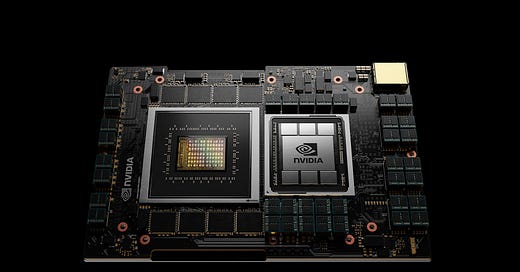AI chip-building bonanza
Sam Altman, Nvidia, and everyone else wants to get in on building AI-focused silicon
Welcome to the first ‘normal’ edition of The Angle – a weekly roundup of the biggest stories in tech from the past week, with smart, short contextual analysis so you know why it matters. For new subscribers – which is currently everyone – this is what all free members will receive weekly. Paid subscribers also get the Tuesday edition, a single-topic focused column that goes more in-depth. This preamble is one-time only, so thanks for your patience, and now on to the main event.
More custom AI chips are coming, and so is the capacity to keep up with making them.
Nvidia is doubling down on its AI hardware lead with a dedicated business unit focused on designing custom chips for potential customers including OpenAI, Google, Amazon, Meta and Microsoft, per a new Reuters report.
Bespoke silicon for AI processing isn’t a new thing: Intel has tried to crack Nvidia’s AI advantage with things like field programmable gate array (FPGA) processors that can be configured to support very specific AI workloads, for instance.
Apple and Google are also very much into dedicated parts of their mobile system-on-chips (SoCs) to local AI processing tasks. And Apple basically doesn’t talk to Nvidia ever since a bad batch of GPUs resulted in a generation of faulty Mac hardware.
Nvidia already makes the best general purpose AI computing hardware available, as kind of a happenstance byproduct of how good its gaming and computer graphics GPUs are at also doing things like running inference models.
Meanwhile, Sam Altman is apparently looking for (via WSJ) a big pile of cash to massively expand the global capacity for manufacturing chips, in part because of the projected future need for semiconductors to power the ongoing AI revolution his company has mostly led.
Adam Neumann: WeWorked before (sort of) – can WeWork again?
WeWork founder and noted barefoot enthusiast Adam Neumann is trying to buy back the company he founded, and ran in a manner that earned him a dramatic portrayal by Jared Leto (via NYT).
His goal is to pick up the bankrupt business he helped create and then crater, but the company is apparently not too receptive to his overtures according to Neumann’s lawyers – who include Alex Spiro, Elon Musk’s infamous chief counsel.
Neumann might be able to get WeWork at a relative steal – around $500 million – if anyone on the side of the floundering office space company ever answer his emails.
Whatever you think of Neumann’s chaotic run at the startup, there’s no denying he identified a market gap and unlocked a huge amount of interest and inventory by dressing it up as a tech play – fundamentally changing how we think about the concept of the ‘office’ in the process. Maybe he should get another kick at the can.
Disney takes aim at a new generation with Epic Games position
Disney is buying an ownership stake in Epic Games valued at $1.5 billion, the companies announced this week (via The Verge).
Epic’s Fortnite is so pervasive among the pre-teens and teens demo that it’s not unreasonable to liken it to the success of Disney circa 10, 20 or even 50 years ago.
Disney and Epic have worked together plenty in the past, but this equity stake means their destinies are yoked and incentives are better aligned, which almost certainly means insufferable ‘expanded cinematic Fortnite universe’ content forced upon us until we’re all absolutely sick of it.
That’s the big stuff this week in tech – my goal is to keep it high-level and high-impact, but if you think I missed anything super important or just have other feedback to share, please drop me a line at darrell@theangle.com – all feedback welcome.
Remember, if you want to receive and read Tuesday’s deep dive, single topic column, be sure to join as a paid member and support The Angle directly. Either way, thanks for reading and please share with your network if you enjoy the newsletter.




